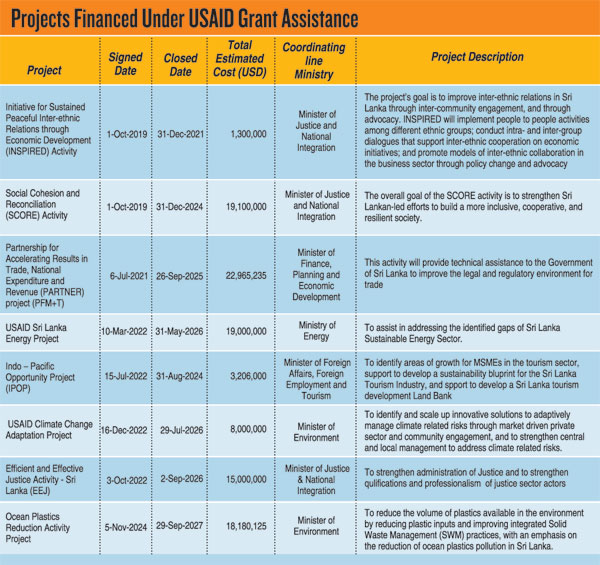News
USAID: Govt largest recipient; projects in four ministries hit
View(s):By Mimi Alphonsus
The USAID funding freeze has left several non-governmental organisations (NGOs) high and dry, but the government sector, too, is deeply affected.
Four ministries and several departments under them were receiving USAID grants at the time of the freeze and are now looking for money to continue their projects.
Data obtained from the Department of External Resources (ERD) reveal that since 2019, USAID has financed Sri Lankan government projects amounting to Rs. 31 billion (USD 106 million). Of these, projects costing USD 20.4 million were signed during the last year (2019) of the Maithripala Sirisena government.
USD 41.9 million was signed during the Gotabaya Rajapaksa government, USD 26 million during the Ranil Wickremesinghe government, and USD 18.1 million so far during the Anura Kumara Dissanayake government.
Although the Sunday Times was unable to obtain information on all USAID projects, calculations using USAID’s website (now shut down) and data from the ERD suggest that between a third and half of all USAID funding in Sri Lanka was towards the government’s projects.
At the time of the funding freeze, one project with the Justice Ministry, one with the Finance Ministry, two with the Environment Ministry and one with the Energy Ministry were ongoing.
An ongoing Finance Ministry project, Partnership for Accelerating Results in Trade, National Expenditure and Revenue (PARTNER), was intended to “provide technical assistance to the government of Sri Lanka to improve the legal and regulatory environment for trade.” The implementing partner, Deloitte Consulting LLC, worked on projects such as designing a Biotechnology Innovation Park and implementing a “single window” trade portal to “streamline trade-related regulatory measures.”
The USD 22.9 million project was also working with the Auditor General, Inland Revenue Department, Customs Department, and Excise Department, among others, revealed parties who collaborated on the project but wished to remain anonymous.
The project envisions setting up a public debt management office, digitising the customs long room, and proposing regulations in line with the new Public Finance Act when the US government issued its “stop work” order.
Another USAID project, “Efficient and Effective Justice,” was allocated USD 15 million. In a written response to the Sunday Times, the Justice Ministry said USAID developed nine “model courts” through digitised case management systems, provision of IT equipment, and training of judges, court staff and members of the Bar Association of Sri Lanka.
The ministry was due to develop 10 more model courts and a complete training programme on the new system’s use when the funding freeze took place.
USAID has not formally communicated with government officials, but the ministry said that “possible avenues are currently being explored to integrate the activities, such as training and awareness programmes, into other ongoing projects conducted.”
Another USD 19 million fund towards the “Sri Lanka Energy Project” provided technical assistance to the Central Electricity Board (CEB), Lanka Electricity Company (LECO) and the Sri Lanka Sustainable Energy Authority (SLSEA), according to the Energy Ministry’s annual reports. The projects aimed to develop renewable energy, including through solar power plant installments.

| Sarvodaya stops US-funded programme Sri Lanka’s largest non-governmental organisation, Sarvodaya, received 15% of its funding from USAID, particularly for its disaster risk reduction work. Sarvodaya told the Sunday Times it had been forced to stop its work aimed at forming volunteer groups for disaster response and training communities on disaster preparedness. It has also had to lay off staff. As a result of the USAID funding freeze, large NGOs like Sarvodaya have been forced to scale down while smaller ones have closed doors entirely. Despite the severe impact, planning for the future has proved difficult, partly due to a lack of information from USAID’s end, they said. Several NGOs, including Sarvodaya, and government entities said they had not received clear communication from USAID besides the initial “stop work” order. Beyond press statements that are not country-specific, USAID, the US embassy, and USAID’s implementing partners have been unwilling to comment or share information. Furthermore, USAID’s website—which housed information about its projects—was taken down soon after the funding freeze. The lack of transparency has been exacerbated by claims attributed to the White House but found to be misleading or false by reputable fact-checkers. Transparency has been a key issue raised by beneficiaries of international funding in Sri Lanka. The Sunday Times spoke to four local partners working on USAID projects. They spoke on the condition of anonymity. They said a large part—often more than half—of a grant goes to USAID’s implementing partners, usually large international for-profit and non-profit companies. Some of these implementing partners, the sources said, were in turn needlessly “stingy” on the ground. Acknowledging that USAID projects are large-scale and difficult to manage, requiring a lot of specialised skill and administration from implementing partners, they complained of the unequal and untransparent relationships these partners had with the local NGOs and government departments they worked with. An ERD circular requires that when working with the government, USAID’s implementing partners report their monthly project expenditures, such as for consultant salaries, IT equipment, and training expenses, to the line ministry. However, implementing partners are not required to disclose their own administrative costs—that is, the share of a USAID grant taken for their own salaries and expenses—to anyone in Sri Lanka. | |
The best way to say that you found the home of your dreams is by finding it on Hitad.lk. We have listings for apartments for sale or rent in Sri Lanka, no matter what locale you're looking for! Whether you live in Colombo, Galle, Kandy, Matara, Jaffna and more - we've got them all!

